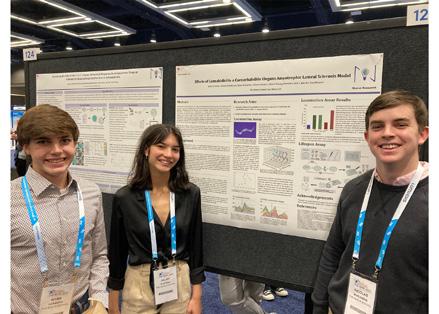
2 minute read
THE NUEVA CURRENT
Disclaimer: For the purposes of the article, the use of “non-male” refers to female and nonbinary people. Sexism is experienced differently by different gender; this article focuses on this group.
Once a month or so, a certain cadence can be heard from inside room 319. For a passerby, it’s a cacophony of finger snaps, “mhm’s,” and “me too’s.” Step inside, however, and this noise resolves itself into cohesion—or rather, affinity.
Advertisement
These oratory agreements came on the heels of an experience shared by Riyana S. ’23, who recalled the exclusion and discomfort she felt speaking up in her math class, for fear the conversation would be “misogynistic in nature” or that by joining, she would be perceived as “flirting.”
“I felt like I couldn't jump into the conversation or participate,” Riyana remembered. “If I made a mistake or messed up, it might be interpreted as an issue of me being a woman.”
More than a dozen female and nonbinary students gathered around the tables at the Female/Nonbinary Experiences in STEM Lunch Group hosted by upper school math teacher Veena Krishnan and I-Lab director Angi Chau. Since last May, students have gathered monthly to share their stories within this listening space.
“There is a certain sense of comfort in being surrounded by people who not only validate and care about your experiences, but understand and share them,” Riyana said.
The listening group originated when a student shared with Chau and Krishnan an instance of sexist behavior in her class.
“We wanted to help this student, of course, but at the same time we wondered, ‘Are there more stories that we weren’t hearing?’” Chau said.
The two teachers sought to create a space for female and nonbinary students to share their perspectives.
“Even if nothing is necessarily acted on, I love having a space where people who identify as female and nonbinary can just talk through what they’re experiencing in a community where they feel safe,” Chau said.
Sexism, the discrimination based on one's gender, can be experienced by anyone. It often manifests as cisgender men exhibiting prejudiced behavior towards female and nonbinary people. While experienced differently by each female and nonbinary person, such discrimination can range from microaggressions to active exclusion.
Such microaggressions are often subtle and unintentional. Kevin Nadal, a psychology professor at John Jay College of Criminal Justice, who has spent decades researching and writing books on the impact of microaggressions, explains the difference between microaggressions and overt discrimination or macroaggressions is that people who commit microaggressions may not even be aware of them.
Luca L. ’23 echoes similar sentiments when it comes to microaggressions in the classrooms.
“There are often things we [male students] might say touching on issues that have a lot of history or baggage that comes with it and a lot of us may not be as educated on the consequences,” he acknowledged. “There might just be a lot of talking without thinking about how it could be interpreted differently.”
Moreover, these actions occur in every stage of life: Deloitte’s 2022 Women @ Work report, which surveyed over 5,000 women, revealed that in 2022, 50 percent of women experience microaggressions in the workplace. A 2022 study by Academic Medicine, a peer-review medical journal, found that 61 percent of female medical students reported facing sexist microaggressions.
This year, upper school students and teachers have joined together to speak up and raise awareness about these unintentional microaggressions.
I. EXPERIENCES IN THE CLASSROOM

A few weeks into her freshman year chemistry class, Carina T. ’24 found herself in a group with another female student and a male student.
“Any time the other female student or I said something, he would say, ‘I don’t think that’s right. Let me go ask the teacher,’ every single time,” Carina recalled. “That’s just disrespectful.”
Coffeehouse Coziness
BACK TO SCHOOL "LATINX" OR NOT?
Students reflect on their experiences in the newly revived Japanese exchange program.
Xrt Conference
Biochemistry students visited Seattle to present research and connect with other student scientists. READ

Politicians are banning the term—community members break down why.









